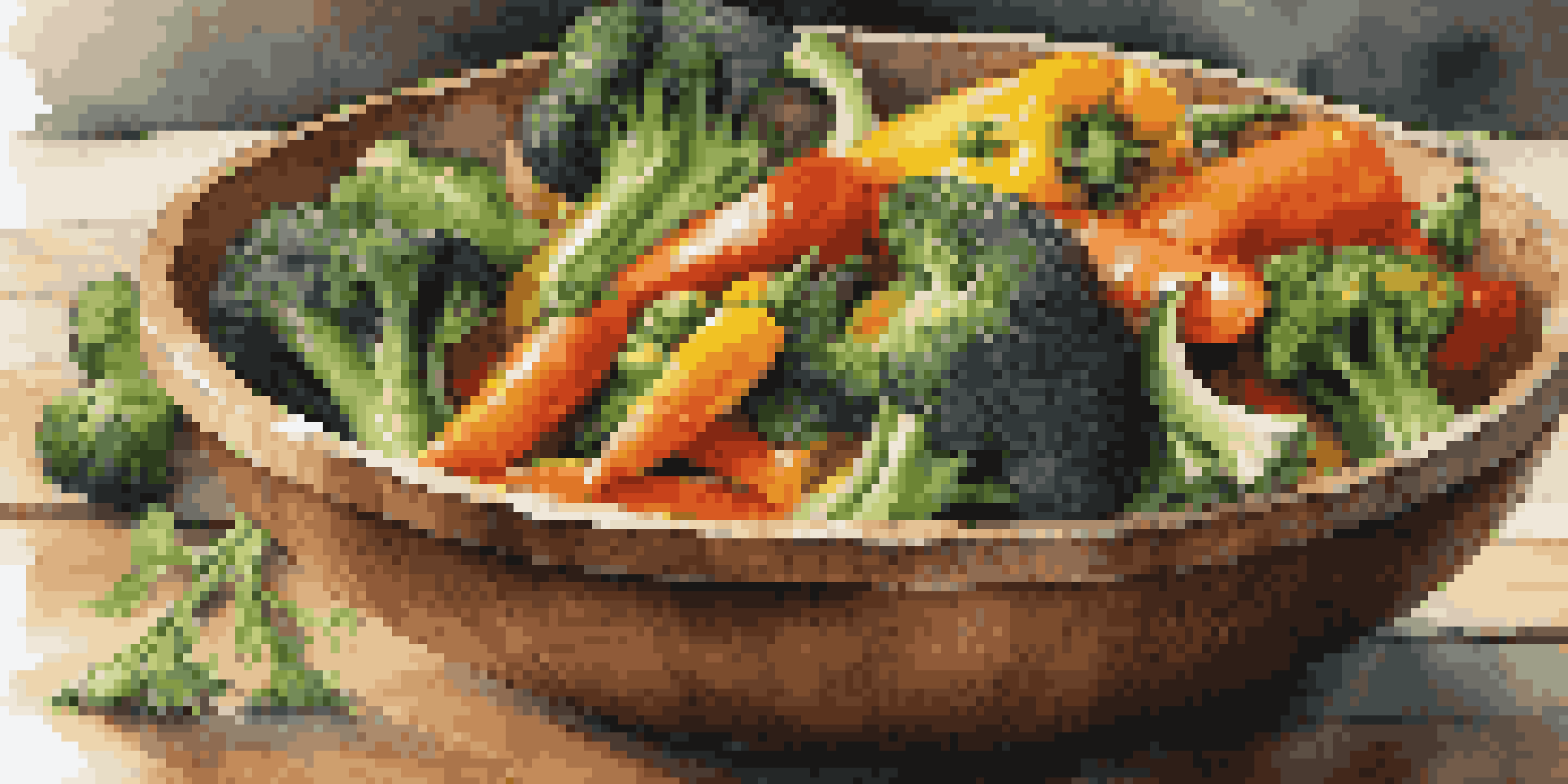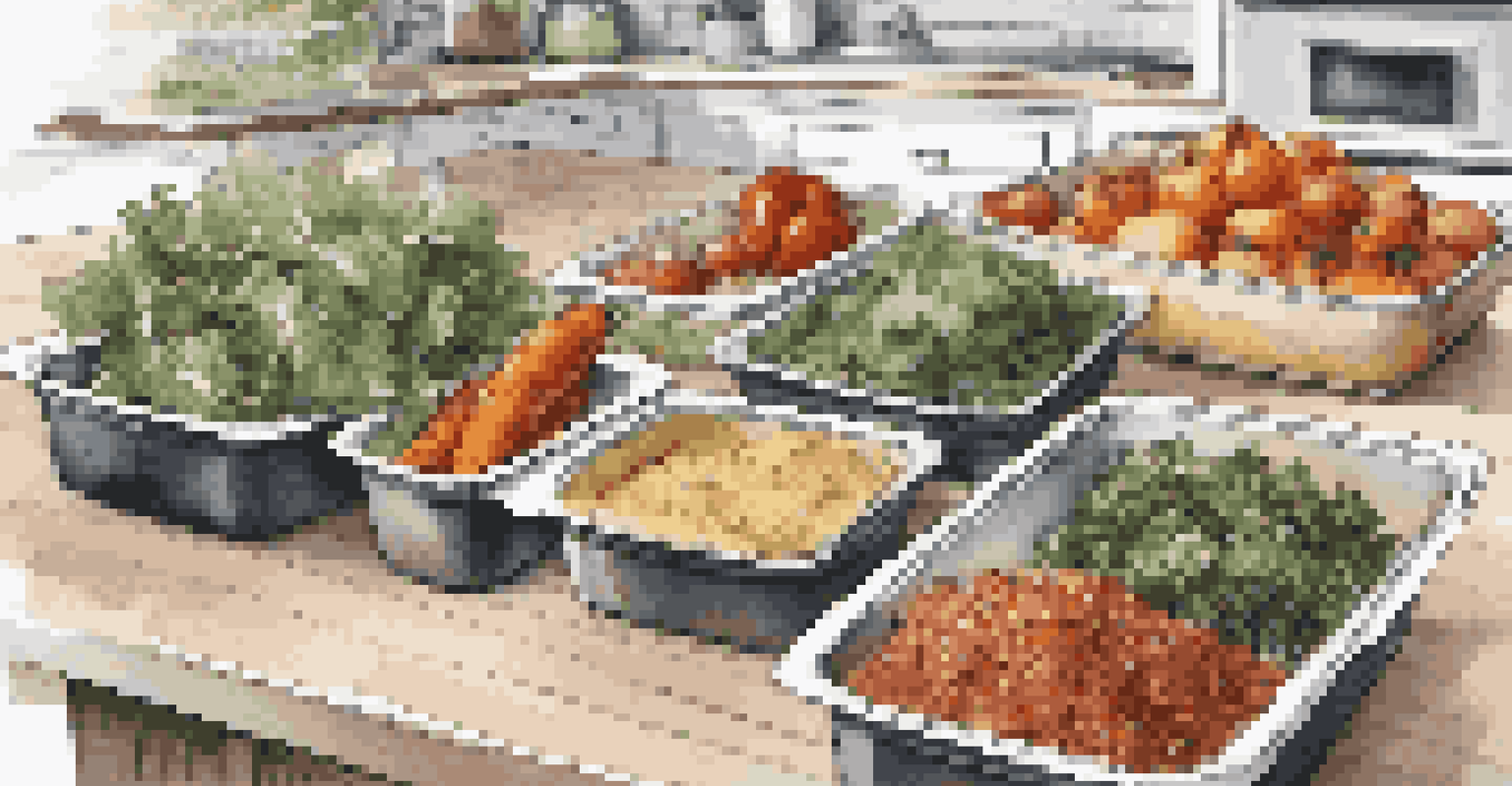Sustainable Cooking: Tips for Eco-Friendly Meal Prep

Understanding Sustainable Cooking and Its Importance
Sustainable cooking isn't just a trend; it's a necessity for our planet. It involves using methods that minimize environmental impact while maximizing flavor and nutrition. By adopting sustainable practices, we can contribute to reducing waste and conserving resources, ultimately benefiting our ecosystems.
The greatest threat to our planet is the belief that someone else will save it.
Think of sustainable cooking as a way to create delicious meals while being mindful of how our choices affect the planet. Whether it's sourcing local ingredients or reducing energy consumption in the kitchen, every little step counts. The more we embrace these practices, the greater the positive impact we can make.
Imagine preparing a vibrant vegetable stir-fry using produce from your local farmer's market. Not only are you supporting local economies, but you're also ensuring that your meal is fresh and bursting with flavor, all while reducing your carbon footprint.
Start with a Plant-Based Foundation
One of the easiest ways to make your cooking more sustainable is to focus on plant-based meals. Incorporating more fruits, vegetables, grains, and legumes into your diet can significantly lower your environmental impact. Plus, plant-based ingredients are often more affordable and versatile.

For instance, consider swapping out meat for beans in your favorite chili recipe. This simple change not only reduces the carbon emissions associated with meat production but also adds a delightful texture and flavor to your dish. It's a win-win for your taste buds and the planet!
Adopt Sustainable Cooking Practices
Embracing methods that minimize waste and support local economies is crucial for healthier meals and a healthier planet.
As you experiment with plant-based meals, you might discover new favorites that you never considered before. Don't be afraid to try out different herbs and spices to elevate your dishes, showing that sustainable cooking can be both nutritious and delicious.
Plan Your Meals to Reduce Food Waste
Meal planning is a powerful tool in the fight against food waste. By organizing your meals for the week, you can ensure that you're using ingredients efficiently and avoiding unnecessary purchases. This not only saves you money but also helps reduce the amount of food that ends up in landfills.
You cannot get through a single day without having an impact on the world around you. What you do makes a difference, and you have to decide what kind of difference you want to make.
Start by checking your pantry and fridge to see what you already have. Create a list of meals that incorporate these ingredients, making adjustments based on what's in season or on sale. This thoughtful approach to meal prep can lead to creative and satisfying dishes.
Remember, leftovers are your friend! Transform yesterday's dinner into a new meal, like using roasted vegetables in a frittata or blending them into a soup. This way, you’re being resourceful while enjoying a variety of flavors throughout the week.
Choose Local and Seasonal Ingredients
When shopping for ingredients, consider choosing local and seasonal produce. Not only does this support local farmers, but it also means you're getting fresher ingredients that are often more nutrient-dense. Plus, seasonal ingredients are usually more affordable and taste better!
Think about it: biting into a juicy, sun-ripened tomato in the summer versus one that’s been shipped from thousands of miles away. The difference in flavor is remarkable! By aligning your cooking with the seasons, you can truly enhance your culinary experience.
Focus on Plant-Based Meals
Incorporating more fruits, vegetables, and legumes into your diet can significantly lower your environmental impact while enhancing flavor.
Many grocery stores now label local products, making it easier to identify what’s nearby. Additionally, visiting a local farmer's market can be a fun way to discover new ingredients and learn more about sustainable farming practices.
Embrace Zero-Waste Cooking Techniques
Zero-waste cooking is all about maximizing every part of your ingredients, reducing waste to a minimum. This approach can be as simple as using vegetable scraps to make homemade broth or repurposing stale bread into croutons. The goal is to find creative ways to use what you have.
For example, when peeling vegetables, save the skins and ends to make a nutritious stock. Not only does this minimize waste, but it also adds depth to your dishes. You might be surprised at how much flavor can come from what we often consider 'waste.'
Additionally, consider composting your scraps if possible. This practice not only reduces the amount of waste sent to landfills but also creates nutrient-rich soil for future gardening endeavors, creating a beautiful cycle in your cooking journey.
Make Use of Energy-Efficient Cooking Methods
Energy-efficient cooking methods not only save you money but also reduce your environmental footprint. Techniques like steaming, slow cooking, or using a pressure cooker can help you prepare meals while consuming less energy. These methods also often enhance the flavors and nutrients in your food.
For instance, using a pressure cooker to prepare beans or grains can cut cooking time dramatically, allowing you to enjoy nutritious meals without long waits. Plus, you’ll find that less energy is needed throughout the cooking process, which is a win for both your wallet and the planet.
Utilize Leftovers Creatively
Transforming leftovers into new dishes not only reduces waste but also saves time and effort in the kitchen.
It's also helpful to use lids on pots and pans to retain heat and cook food more efficiently. Small adjustments like these can make a big difference in your overall energy usage in the kitchen.
Get Creative with Leftovers and Meal Prep
Leftovers are a goldmine for sustainable cooking and can be turned into new meals to keep things exciting. Instead of viewing them as an afterthought, think of creative ways to repurpose them into entirely different dishes. This not only reduces waste but saves you time and effort in the kitchen.
For example, if you made a large batch of roasted vegetables, consider using them in salads, grain bowls, or even as toppings for pizzas. The possibilities are endless when you let your imagination run wild with what you already have.

Additionally, invest in good-quality containers to store your leftovers and make meal prep a breeze. Having pre-prepared ingredients on hand can inspire you to whip up quick, healthy meals without reaching for takeout.